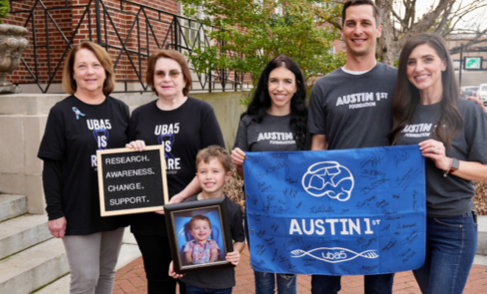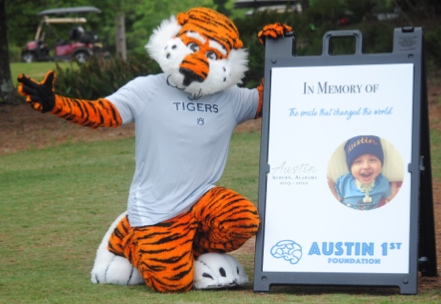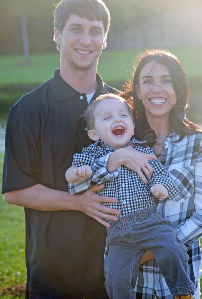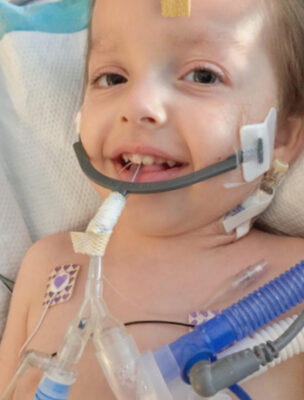by Ann Cipperly
As one of the first diagnosed with an ultra-rare genetic condition, Austin Terling was remarkable in his nine years of life to smile often through long hospital stays and an inability to sit, walk or talk, requiring 24/7 medical care. Although he was unable to communicate his pain and feelings to his parents, Lindsey and Anthony Terling, Austin’s tender spirit was inspirational to those who knew him.
With little known about certain rare diseases, the Terlings formed the Austin 1st Foundation (A1F) to help other families going through similar situations, hosting Aces Fore Austin’s annual golf tournament and providing toys at Children’s Hospital in Birmingham for Austin’s 1st Christmas.
 Austin was one of 45 patients currently diagnosed across the country born with the UBA5 Genetic Mutation. Testing children for rare diseases can take an average of five to seven years for a diagnosis. It was a long, exhausting journey for Austin and his family to receive an accurate diagnosis.
Austin was one of 45 patients currently diagnosed across the country born with the UBA5 Genetic Mutation. Testing children for rare diseases can take an average of five to seven years for a diagnosis. It was a long, exhausting journey for Austin and his family to receive an accurate diagnosis.
After Anthony and Lindsey married, they knew they wanted to live in Auburn. While they grew up in Montgomery, Auburn felt like home since Anthony attended Auburn University, as well as his parents and others in the family. Lindsey knew the schools were good, but never realized they would become vital after their son Austin was born.
“We didn’t know we would have a child with special needs, and how much it would play a role with Austin,” says Lindsey. “It shows how everything happens for a reason for us choosing to move to Auburn in 2012, and Austin was born June 27, 2013. Later, Sullivan was born April 27, 2017.” Over time, the number “27” became a significant number to the family.
While Lindsey’s pregnancy and delivery with Austin were normal, they soon realized he had dislocated hips, which is not that unusual. When he was two months, he began wearing a cast with his legs straight out.
“I knew something else was going on with Austin,” says Anthony. “I remember feeding him, and he would gaze through me. It was like something didn’t seem right. It took over an hour to feed him a small bottle of milk.”
The couple took Austin to a variety of doctors for testing. “Then we took him to Vanderbilt,” says Anthony, “because we were big on multiple opinions and started going to the lengths of the earth to find out what was wrong with him. We saw an amazing doctor who lined us up with numerous specialists.”
After many tests, the diagnosis was quadriplegia cerebral palsy, as he was not sitting up and doing other milestones a child would be doing at eight months. However, the doctor said she didn’t believe he had it.
 “I started to think maybe it was developmental delay,” says Anthony, “and maybe he will catch up, but the doctor was adamant that there was something going on. The doctor said she needed to give us the key to unlock the door, which was giving him diagnoses so insurance would cover available resources.
“I started to think maybe it was developmental delay,” says Anthony, “and maybe he will catch up, but the doctor was adamant that there was something going on. The doctor said she needed to give us the key to unlock the door, which was giving him diagnoses so insurance would cover available resources.
“Basically we had about 12 diagnoses. It started opening doors, such as getting a seat for Austin to sit in. Those things are expensive, and insurance doesn’t cover some needed items, and without an accurate diagnosis many things are not approved by insurance. Those are challenges people have with a rare disease or any disease not recognized by insurance.”
Austin started going to the HAPIE Preschool at Auburn Early Education Center. “They do an amazing job for those with special needs,” says Lindsey. “He only lasted until he was ready for first grade. Then, he became more medically challenged.”
In 2015, Whole Exome Sequencing (WES) testing was approved. It was difficult getting approval for a $10,000 test. At the same time, Austin was placed in a research program at HusdonAlpha in Birmingham.
“One out of 10 Americans have rare diseases,” says Anthony. “This is not a small problem. It is not easy to find someone to help if you are not sure what you need. They told us to look on Facebook.
“Dr. Lane Ruthledge with her team at UAB is the reason we got the diagnosis for Austin,” he adds. “She helped us connect to other parents in the country. We are connected to four families, and we all have a nonprofit charity that has supported us. It shows the power of persistent parents to find the best help for their kid or family member.”
 Anthony’s father read an article on AOL.com about the state having funds available for undiagnosed testing and texted it to him. “That is where UAB and HudsonAlpha come in,” Anthony says. “There is an undiagnosed net- work in the country that supports finding diagnosis for those who are undiagnosed. It was key to Austin’s diagnosis.”
Anthony’s father read an article on AOL.com about the state having funds available for undiagnosed testing and texted it to him. “That is where UAB and HudsonAlpha come in,” Anthony says. “There is an undiagnosed net- work in the country that supports finding diagnosis for those who are undiagnosed. It was key to Austin’s diagnosis.”
When their other son, Sullivan, was born, Austin was 4 years old and was hospitalized more. He began having problems breathing with his “floppy airway.” He began arching backward into a half-moon shape, looking as though his body was controlling him.
As Lindsey was taking care of a newborn, Austin was diagnosed with dystonia that was part of the underlying condition. It was making him arch backward. His legs moved constantly, and he couldn’t control it.
They wanted to get Austin out of the house and took him to sporting events. Since the public is not informed on rare diseases, the Terlings overheard people saying hurtful things and were told comments, such as, “hold his head so he won’t bend backwards.”
As Austin continued to have health problems, he went into respiratory failure as his lungs collapsed. He was in ICU at Children’s Hospital. For his diagnosis to be medically confirmed, two diagnoses were needed for the condition. Dr. Ruthledge at UAB was able to push his diagnosis through.
A trach was inserted, and he had a feeding tube. The trach had to be changed every week. Anthony and Lindsey had to learn how to remove the medical device from their child. By law, they had to have a to-go bag next to him at all times. After 40 days in the hospital, Austin went home with his parents as his caretakers.
The family was home for a week when Austin had a full-blown seizure with full body shaking. They called 911. Then the seizures began once a week for three weeks from 1 a.m. until 3 a.m. Meds were needed to stop the seizures.
“We had a two-hour meeting in January 2022 with his doctors, which were seven or eight,” Anthony says, “and started asking what to do now. How could we stop the seizures and make him comfortable. Watching your child slowing deteriorating is just as much like grieving as when you actually lose someone.”
They were able to get a diagnosis of a mutation in the UBA5 gene that showed them a road map as to why he had the physical limitations and seizures.
“We wondered if we could provide him with a quality of life,” says Anthony, “and we felt we could give him enough. When one of us walked in the room, he would always smile. Austin had a connection with my dad (Pap Pap), and he would smile big at hearing the name Pap Pap or seeing him.
“Austin dealt with these things every day 24/7 for nine plus years all from the genetic condition he had,” his father says. “We have been part of studies. Lindsey and I have a chromosome of the UBA gene. We both passed a mutated UBA5 gene to Austin. He was born a beautiful child with challenges.
“It was a miracle that Sullivan was already born since there is an 80 plus percent chance it could happen again. It was a God thing to say we found out the real diagnosis after Sullivan was born because we wanted more children but didn’t know it could have happened again.”
During his hospital stay, Anthony opened a devotional book and read the verse for Austin’s birthday. The Bible verse was specific to what they were going through and still going through now. It was John 13:7.
The last two years of Austin’s life at home were the hardest for him and his parents. He spent most of the time in a hospital bed.
“We are thankful that it taught us a lot of things to be thankful about,” says Anthony, “and that small things matter. We would have continued the journey for 100 years if we could, except wishing Austin hadn’t had that challenge.
“We know his suffering did not come without a story that we can tell to help people, and it helped us. I can’t tell you how many people have reached out that have been touched by Austin’s story. He made me a better person. I think that is the power of relating to people.”
They write a blog once a month. “We want to carry on his legacy,” says Lindsey. “He was here for a reason. Seeing his life unfold in the last nine years, there were times we thought it was not fair, but people in our lives would remind us that it was alright. You can’t control it, but you can control your attitude and choose whether you smile or not.”
Austin passed away July 16, 2022. At 9 years of age, he was still like a two-month- old, and never sat up, crawled, walked or talked. He was on a liquid diet, being tube fed most of his life. Austin was always smiling through his situation and pain with joy for just being with his family.
The beloved child’s legacy is being remembered and carried on in the Austin 1st Foundation, “Champions for Rare Diseases,” and at Christmas with toys given to patients at Children’s Hospital in Austin’s 1st Christmas.
After struggling with finding information, diagnosis and resources to help their son Austin with a rare disease, Lindsey and Anthony Terling were determined to offer assistance to other families dealing with similar situations. They created the Austin 1st Foundation (A1F), “Champions for Rare Diseases,” to raise awareness and research funds to provide support for families.
“Austin reminds us that even though he is gone from his earthly body, he can still give to others,” Anthony says. “His foundation can have an impact as he did on many during his nine short years of life. A1F is how we can turn this negative into a positive because we always said that child is a light with the biggest smile. We were determined to create a foundation to help others.”
Anthony had worked in nonprofits, and his and Lindsey’s families had been involved in phi- lanthropy. In 2018, the Terlings put a business plan together for the nonprofit charity based on research for rare disease treatments and diagnosis, and to create awareness and positive change for those living with rare disease. Over the past nine years, they discovered 45 patients with UBA5 Mutation were diagnosed in different ways. Some received a diagnosis at eight months, while others were in their teens. “Austin was potentially the first documented known diagnosis in North America,” adds Anthony, “but that has nothing to do with A1F. It has to do with the fact that when you have something that is first in your life, it has priority. For us that is Austin.
“When we tried to have the first golf tourna- ment, we had to change course to take care of Austin as his condition digressed,” recalls Anthony. “We knew as Sullivan got older it was going to get harder. He hadn’t started school and playing sports.”
After Austin passed away July 16, 2022, Anthony’s mentor Dr. George Schaefer, who was his professor at AUM in sports manage- ment, talked to him about holding a charity golf tournament for A1F. Anthony had worked on a golf tournament that he helped create and manage to raise funds for women’s basketball scholarships. Anthony didn’t realize his plans for that golf tournament would become Aces Fore Austin.
Dr. Schaefer assured him that he would have the backing with sports management students basically doing all the things that go into it, and then implementing it.
“We knew we had help with A1F and had a board with family members,” Anthony says, “and the rest was history. We look at those things as positive. They were God things. We didn’t want to lose Austin and my dad two months later on Sept. 27. My dad and Austin were connected. When we said Pap Pap, Austin would have the biggest smile we have seen.”
With plans for the golf tournament, Anthony talked to Grand National about the charitable event. AU Network were great partners, and many organizations, businesses and people sponsored and promoted it to have awareness of what they were doing.
“Our focus was funds for research and support,” Anthony says. “After the expenses, 95 percent would be donated. We have donated $6,000 of the $22,000 we netted to Raiden Science Foundation, as they are the key partner to having the advanced research through Oregon Health and Science University. They are doing research on drug repurposing on UBA5 Mutation, which is directly for the condition.
“We are starting to work with other groups on rare disease as a whole,” Anthony adds. “Since UAB has the undiagnosed disease program, $16,000 is being donated to them.”
The next Aces Fore Austin Golf Tournament will be held June 10, 2024.
Before the Terlings started the foundation, they used personal funds to donate toys and gifts to the Children’s Hospital during the Christmas season, through the Sugar Plum Shop. Austin went with them a few times to deliver the gifts. It was a warehouse filled with toys, including bikes and items for newborns to 18-year-olds.
With A1F, the project is now a fundraiser named Austin’s 1st Christmas. The website (austins1stchristmas.org) lists ways companies and individuals can donate. “It is a way we can create more awareness for the kids, but also raise more funds that we can donate,” says Lindsey.
Founded on April 4, 2019, A1F is a 501 (c) (3) non-profit public charity. There are no paid employees, and it is a “Gold” level transparent member of Candid’s GuideStar program for non- profits. www.austin1stfoundation.org.


